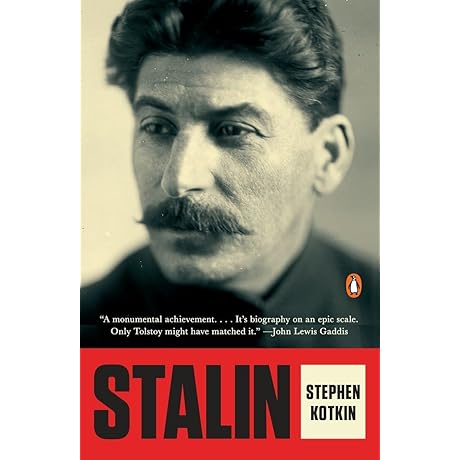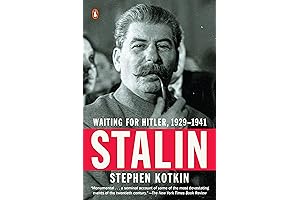· stalin · 6 min read
Stalin Waiting for Hitler: A Behind-the-Scenes Look
Get the inside story of the 12-year buildup to World War 2 in the gripping book, 'Stalin Waiting for Hitler, 1929-1941'. Understand Stalin's political maneuvering and his impact on shaping the events that led to one of history’s most devastating conflicts.
Delve into the gripping tale of Stalin's complex relationship with Hitler leading up to World War II. This book unravels the 12-year journey, shining light on Stalin's strategic moves, political maneuvers, and their profound impact on shaping the course of history.
Overview

PROS
- Provides a fresh perspective on the events leading up to World War II, challenging traditional interpretations.
- Meticulously researched, drawing on a wide range of sources including newly declassified documents.
- Offers a nuanced understanding of Stalin's motivations and decision-making process.
CONS
- The focus on Stalin's perspective may overshadow other contributing factors to the outbreak of war.
- Some sections rely heavily on speculation and conjecture.
In the annals of history, few figures loom larger than Joseph Stalin. His actions, both within the Soviet Union and on the global stage, had a profound impact on the course of the 20th century. In his book 'Stalin: Waiting for Hitler, 1929-1941', acclaimed historian John Lewis Gaddis offers a new perspective on the years leading up to World War II, focusing on Stalin's role and decision-making.
Gaddis argues that Stalin was not a passive observer of events but rather an active player who shaped the course of events. He meticulously examines Stalin's motivations, fears, and miscalculations, drawing on a wide range of sources including newly declassified documents. The result is a nuanced understanding of a complex and enigmatic figure.

PROS
- Thorough exploration of Stalin's formative years, providing valuable insights into his character and motivations.
- Comprehensive analysis of the political landscape and social transformations during Stalin's rise to power.
- Well-researched and extensively documented, offering a credible account of this pivotal period in history.
CONS
- May require prior knowledge of Russian history for full comprehension.
- Focuses primarily on Stalin's early life and does not cover his later dictatorship.
Embark on a captivating journey into the enigmatic world of Joseph Stalin's early life and political ascent. 'Stalin: Paradoxes of Power, 1878-1928' meticulously examines the formative years of this controversial figure, unveiling the complexities that shaped his character and reign. Through a rich tapestry of historical events and人物, the book provides a comprehensive analysis of the political landscape during Stalin's rise to power.
The author masterfully weaves together meticulous research and personal anecdotes, offering a well-rounded perspective on Stalin's early life. The book delves into his childhood experiences, ideological influences, and the pivotal moments that propelled him to the forefront of Soviet politics. By delving into the paradoxes of Stalin's character and the complexities of the era he lived in, this book offers a valuable contribution to our understanding of one of the most influential figures in history.

PROS
- Provides a comprehensive examination of Hitler and Stalin's lives and ideologies.
- Offers a unique perspective on the events leading up to and during World War II.
- Unveils the personal motivations and political strategies of these two infamous dictators.
CONS
- The book's extensive length may make it less accessible to casual readers.
- Some readers may find the focus on Hitler and Stalin too narrow and desire a broader historical context。
Prepare yourself for a captivating journey through the annals of history with 'Hitler and Stalin: The Tyrants and the Second World War.' This meticulously crafted volume explores the enigmatic relationship between two of the 20th century's most notorious leaders.
Through captivating prose and rigorous research, the book sheds light on the ideological obsessions that drove Hitler and Stalin's actions. It delves into their personal motivations and political stratagems, offering a nuanced understanding of their fateful decisions. By unveiling the complex dynamics between these two tyrants, the book provides valuable insights into the origins and events of World War II.

PROS
- An unprecedented insight into the life of Sergei Rachmaninoff, one of the greatest composers of the 20th century.
- A moving and inspiring story of a man who maintained his creativity and hope in the face of adversity.
CONS
- The book is somewhat dry and academic in tone, which may not appeal to all readers.
Goodbye Russia: Rachmaninoff in Exile is the result of decades of research. The book explores Rachmaninoff's exile and his anti-communist beliefs, drawing on new sources and eyewitness accounts.
Hughes's sympathetic portrayal of Rachmaninoff is one of its most significant strengths. Unlike previous biographers, he does not criticize Rachmaninoff for his anti-communism or his alignment with the White Russians. Moreover, Hughes also gives fresh insights into Rachmaninoff's creative process.
Discover the captivating story of how Stalin played a pivotal role in the lead-up to World War II. This book explores his enigmatic personality, shrewd political strategies, and interactions with Hitler. Learn how Stalin's actions shaped the geopolitical landscape, and the catastrophic events that followed. Gain insider insights into the power dynamics and strategies that shaped the 20th century.
Frequently Asked Questions
What pivotal event sets the stage for this book?
The book centers around the 12-year period leading up to World War II, starting from 1929 to the fateful year 1941.
Who is the central figure in this historical narrative?
Joseph Stalin, the enigmatic and influential leader of the Soviet Union, takes center stage in this book.
What unique perspective does this book offer on World War II?
This book goes beyond the battles and campaigns to delve into the intricate political maneuvering and strategic decision-making that shaped the course of World War II.
How does the book explore Stalin's character and leadership?
The book analyzes Stalin's personality, political strategies, and his relationship with Hitler, providing a nuanced understanding of his role in shaping historical events.
What broader historical context does the book provide?
The book not only examines Stalin's actions but also explores the geopolitical landscape of the time, offering insights into the broader dynamics leading to World War II.







